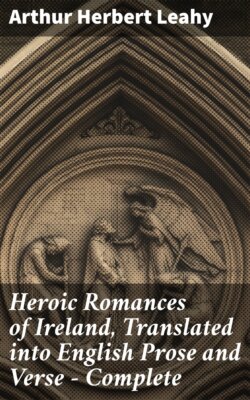Читать книгу Heroic Romances of Ireland, Translated into English Prose and Verse — Complete - Arthur Herbert Leahy - Страница 4
На сайте Литреса книга снята с продажи.
INTRODUCTION IN VERSE
ОглавлениеTable of Contents
'Tis hard an audience now to win
For lore that Ireland's tales can teach;
And faintly, 'mid the modern din,
Is heard the old heroic speech.
For long the tales in silence slept;
The ancient tomes by few were read;
E'en those who still its knowledge kept
Have thought the living music dead.
And some, to save the lore from death,
With modern arts each tale would deck,
Inflate its rhymes with magic breath,
As if to buoy a sinking wreck.
They graft new morbid magic dreams
On tales where beating life is felt:
In each romance find mystic gleams,
And traces of the "moody Celt."
Yet, though with awe the grassy mound
That fairies haunt, is marked to-day;
And though in ancient tales are found
Dim forms of gods, long passed away;
Though later men to magic turned,
Inserting many a Druid spell;
And ill the masters' craft had learned
Who told the tales, and told them well;
No tale should need a magic dress
Or modern art, its life to give:
Each for itself, or great, or less,
Should speak, if it deserves to live.
Think not a dull, a scribal pen
Dead legends wrote, half-known, and feared:
In lettered lands to poet men
Romance, who lives to-day, appeared.
For when, in fear of warrior bands,
Had Learning fled the western world,
And, raised once more by Irish hands,
Her banner stood again unfurled;
'Twas there, where men her laws revered,
That Learning aided Art's advance;
And Ireland bore, and Ireland reared
These Eldest Children of Romance.
Her poets knew the Druid creeds;
Yet not on these their thoughts would rest:
They sang of love, of heroes' deeds,
Of kingly pomp, of cheerful jest.
Not as in Greece aspired their thought,
They joyed in battles wild and stern;
Yet pity once to men they taught
From whom a fiercer age could learn.
Their frequent theme was war: they sang
The praise of chiefs of courage high;
Yet, from their harps the accents rang
That taught to knighthood chivalry.
Their heroes praise a conquered foe,
Oppose their friends for honour's sake,
To weaker chieftains mercy show,
And strength of cruel tyrants break.
Their nobles, loving fame, rejoice
In glory, got from bards, to shine;
Yet thus ascends Cuchulain's voice:
"No skill indeed to boast is mine!"
They sang, to please a warlike age,
Of wars, and women's wild lament,
Yet oft, restraining warriors' rage,
Their harps to other themes were bent.
They loved on peaceful pomp to dwell,
Rejoiced in music's magic strains,.
All Nature's smiling face loved well,
And "glowing hues of flowery plains."
Though oft of Fairy Land they spoke,
No eerie beings dwelled therein,
'Twas filled throughout with joyous folk
Like men, though freed from death and sin.
And sure those bards were truest knights
Whose thoughts of women high were set,
Nor deemed them prizes, won in fights,
But minds like men's, and women yet.
With skilful touch they paint us each,
Etain, whose beauty's type for all;
Scathach, whose warriors skill could teach
Emer, whose words in wisdom fall;
Deirdre the seer, by love made keen;
Flidais, whose bounty armies feeds
The prudent Mugain, Conor's queen;
Crund's wife, more swift than Conor's steeds;
Finnabar, death for love who dared;
Revengeful Ferb, who died of grief
Fand, who a vanquished rival spared;
Queen Maev, who Connaught led, its chief.
Not for the creeds their lines preserve
Should Ireland's hero tales be known
Their pictured pages praise deserve
From all, not learned men alone.
Their works are here; though flawed by time,
To all the living verses speak
Of men who taught to Europe rhyme,
Who knew no masters, save the Greek.
In forms like those men loved of old,
Naught added, nothing torn away,
The ancient tales again are told,
Can none their own true magic sway?
